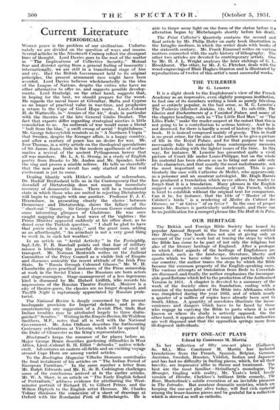Current Literature
PERIODICALS , WORLD peace is the problem of our civilization. Unfortu- nately we are divided on the question of ways and means.
Several articlesinthe Nineteenth Century refleet the divergent lines of thought. Lord Davies goes to the root of the matter in " The Implications of Collective Security." Mutual fear and distrust spring from a general feeling of insecurity : internationally, we are still in a transitional stage of hue and cry. Had the British Government held to its original principles, the present armament race might have been avoided. Lord Davies believes wholeheartedly in the idea of the League of Nations, despite the critics who have no other alternative to offer us, and suggests possible develop- ments. Lord Strabolgi, on the other hand, suggests. that, in hoping for the best, we should prepare for the worst. He regards the naval bases at Gibraltar, Malta and Cyprus as no longer of practical value in War-time, and prophesies a return to the Cape of Good Hope route. Lieut.-Colonel H. de Watteville, in ' Armies of the Air," deals in particular with the theories of the late General Giulio Douhet. The fact that experts differ regarding strategical niceties is little consolation to us. An outbreak of war would mean a literal bolt from the blue," a swift swoop of aerial " frightfulness." Mr. George Soloveytchik reminds us in " A Northern Utopia " that Sweden, despite the Kreug.er affair, is a happy country, and after a century of peace has no desire for war. Mr. Ivor Thomas, in a witty article on the theological speculations of Sir James Jeans, finds in the modern apotheosis of mathe-. matics a revival of the ancient Pythagorean heresy that all was numbers. Mr. L. A. G. Strong, in a study of English poetry from Brooke to Mr. Auden and Mr. Spender, holds the ring and proves a nimble referee. He tells us cheerfully that the new poetic revolt has only started and the real excitement is yet to come.
Dealing bluntly with Hitler's methods of referendum, Dr. Rudolf Breitseheid tells us in the Contemporary that the downfall of Dictatorship does not mean the immediate recovery of democratic ideas. There will be a transitional state in which thcise who are united in rejecting Dictatorship will begin to struggle- with one another-. Professor F. J. C. Hearnshaw, in presenting clearly the choice between Democracy and Dictatorship, shows the fallacy of the " short-cut " theory. Sir George Leveson Gower contributes some interesting glimpses of Gladstone. He was once caught napping during a heat wave of the 'eighties : the Prime Minister appeared suddenly at his office door, as he dozed over the Turkish question. " I shall be glad to have that précis when it is ready," said the great man, adding as an afterthought, " An armchair is not a 'very good thing to work in, in such hot weather."
In an article on " Aerial Activity " in the Fortnightly, • Sqd.-Ldr. P. R. Burchall points out that fear of military misuse is hindering the peaceful development of civil air transport. Mr. Norman Bentwich writes on the -Judicial Committee of the Privy Council as a visible link of Empire and discusses amicably the recent attitude.of the Irish Free State. In " Russia through Coloured Glasses," Mr. W. H. Chamberlin gives practical instances of the Pregs oenSorship at work in the Soviet Union : the Russians are born actors and stage-managers. Stage-management of w less ingenuous , kind is discussed by Mr. Hubert Griffith, wlib records' his impressions of the Russian Theatre Festival -,MoScow is a city of theatre-goers, the classics are no longer despised, and Twelfth Night is rapturously appreciated by Russian prole- tariat.
The National Review is deeply concerned by the present inadequate provision for Imperial defence, and in 'dis- countenancing any SuggestiOn of a Jewish PloWfilids that Indian troubles may be attributed largely to three distin7 guished " Semites." Writing in the Empire Rein ent, Sir Waldron Smithers, M.P., notes that all is well with the- National Government. Mr. John Oldham describes the. forthcoming Centenary celebrations at Victoria; which will be opened by
the Duke of Gloucester as the King's representative. i Blackwood's keeps the romance of far places before us. Major George Bruce describes gardening difficulties in West Africa, Lieut.-Colonel R. H. Elliot " debunks " native witch- craft. Adventures on eastern oil-fields and an exciting voyage around Cape Horn are among varied articles. ,
To the Burlington Magazine Vilhelm Slomann contributes the final instalment of his articles on " The Indian Period of European Furniture." In the same number a letter from Mr. Ralph Edwards and M. K.-de B: Codrington Challenges some of the conclusions 'arrived - at in 'the earlier articles. Mr. W. A. Shaw, in an article on " The Early English School of Portraiture," adduces evidence for attributing the West- minster portrait of Richard II. to Gilbert Prince, and the Wilton Diptych to the English artist Herman. Mr. Charles Tolnay discussei the ConneXhin or-ct --sheet of drawingS at Oxford with the Rondanini Pieta. of Michelangelo. He is
able to throw some light-on- the form- of the statue before the alteration begun by Michelangelo shortly before his death.
The Print Collector's Quarterly contains the second and final article by Mr. Philip Hofer on early book illustration in the Intaglio medium, in which the writer deals with books of the sixteenth century. Mr. Frank Emanuel writes on various matters connected with .the early history of lithography. The other two articles are devoted to contemporary artists. One by Mr. H. J. L. Wright analyses the later etchings of G. L. Brockhurst. The other, by Mr. J. G. Fletcher, deals with the wood-engravings of Blair. Hughes-Stanton and is illustrated by reproductions of twelve of this artist's most successful works.










































 Previous page
Previous page